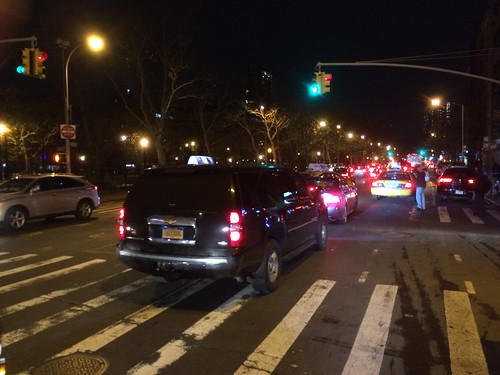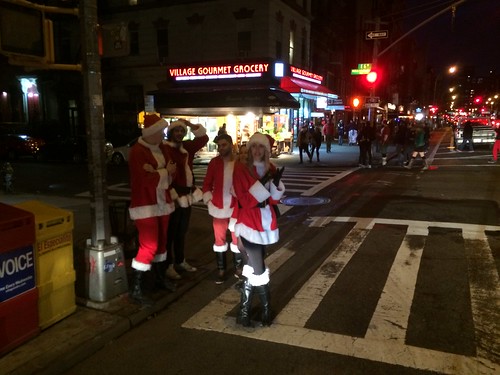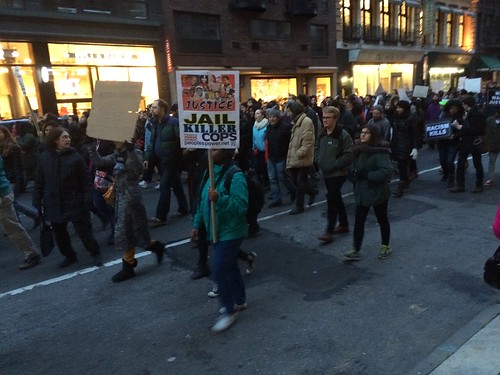The chanting on the night of December 4 sounded muted heard
from my eighth-floor office. But there was no mistaking what was going on.
Rushing over to the window, I peered down into Hudson Street and saw the front of a line
of hundreds of protesters. The leaders were carrying black placards with
slogans picked out in LED lights. “Justice 4 All” and “Black Lives Matter,”
they read.
I felt admiration and fellow-feeling for the demonstrators,
protesting against the decision of a grand jury in Staten Island, just across New York Harbor
 |
| Drivers held up by protests over police brutality: far from determined to uphold the rules themselves. |
But I faced an immediate problem - how, with protests
swarming over much of lower Manhattan , I would
get myself and my bicycle home to Brooklyn . I
opted for a route somewhat to the north of my normal one and successfully reached
the Manhattan Bridge
The experience was, it subsequently occurred to me, an
excellent encapsulation of the crisis in policing of both the US ’s roads and minority –
especially black – communities. Far from looking down on the law, the most
vulnerable people – the protesters, people who don’t own cars – have high
expectations of law enforcement. Fair, undiscriminatory enforcement of
society’s agreed rules is their main protection against those who have more
power than they - or operate vehicles with greater momentum.
Meanwhile, it’s the people commonly regarded as upholders of
society’s order – police officers and those who have taken driving tests and
invested in cars – who often seem, consciously or otherwise, to hold those
rules in most contempt. Many seem to think themselves responsible or
respectable enough not to need to follow the pettifogging details of the rules.
The episode brought to mind a famous passage in which
Immanuel Kant, the 18th century German philosopher, wrote about how justice’s
significance went far beyond any practical effect its execution might have.
Kant expressed his views in relation to the death penalty –
and took a position about the morality of capital punishment with which I
profoundly disagree. But his take on justice’s significance captures something
of why the families of Eric Garner in Staten Island and Michael Brown in Ferguson, Missouri – as well as those of Allison Liao, killed by a driver in
Queens, and Cooper Stock, killed by a driver on the Upper West Side – protest so
loudly over the system’s failing them.
“Even if a civil society resolved to dissolve itself with
the consent of all its members… the last murderer lying in prison ought to be
executed before the resolution was carried out,” Kant wrote. “This ought to be
done in order that every one may realise the desert of his deeds, and that
blood-guiltiness may not remain upon the people.”
The acute problem, however, is not so much that the US – and some
other societies worldwide – is failing to prosecute some brutal police officers
and many, many negligent or even deliberately violent drivers. It’s that by
doing so the authorities send a message to those who follow the rules that
they’re mugs. Refraining from violence at risk to yourself, police officer? Why
not just grab the suspect round the neck? Ignoring that cellphone call so you
don’t endanger other road users, taxi driver? Why? It might be a customer
calling to book a long, profitable ride.
 |
| Minor lawlessness, certainly - but evidence of a corrosive contempt for the rules: a private garbage truck blocks the bike lane, while a delivery truck double parks outside |
The challenge is less that the guilty are going unpunished
and more that virtue is punished by default.
These ideas started forming in my mind nine days before the
December 4 protests, as I took a bike ride on a rare day off work the Tuesday
before Thanksgiving. I rode from home in Brooklyn all the way up Manhattan ’s 1st Avenue
towards The Bronx. Yet it was soon apparent that the relatively new protected
bike lane north of 60th
Street wasn’t going to live up to its promise. I
had to leave the lane repeatedly and pull into fast-moving traffic. Some of the
obstructions were because of building work – but most were because cars were
illegally parked in the bike lane or improperly turning across my path. More
than once, on pulling out of the lane and round the legally-parked cars, I
found a third barrier in the form of an illegally double-parked truck.
At one point, I found a huge semi-trailer truck (articulated
lorry, British readers) had blocked the bike lane to deliver to a store. I
appealed to a nearby traffic police officer to ticket the driver. The driver treated
her with contempt and berated me, as a proxy for all other cyclists, for having
forced him to park there. A previous cyclist had, apparently, sued after the
driver struck him with a trolley while moving goods across the cycle lane from
a legal parking place.
 |
| It's no illegal chokehold - but the parking outside the 52nd precinct in The Bronx police station suggested to me something about its officers' conception of enforcing the law. |
It was no surprise when, later in the ride, I had to manoeuvre delicately around police cars parked illegally on the shared sidewalk and bike path outside the NYPD's 52nd precinct in The Bronx.
None of what I experienced went beyond inconvenience and I
suffered no real harm. But I was soon feeling humiliated and powerless in the face
of the bullying of those who were refusing to follow the rules. I felt angry
that so little was being done to ensure a more equitable, fairer outcome.
Given my feelings over this minor injustice, I can only
imagine the blind rage that Michael Cheung must feel over the failure to take
any serious action against the driver who killed his 90-year-old mother as she crossed a street with the light in New York ’s Chinatown
in October. It must be indescribably painful for a mother such as Dana Lerner
to hear that district attorneys are declining to bring criminal charges against
the cab driver who killed her nine-year-old son, Cooper Stock, on the grounds
the weather was bad when it happened.
I spoke recently to the daughter of someone killed by a
negligent driver while he cycled in Central London .
She expressed her rage at the failure of the police there to investigate the
crime thoroughly and of prosecutors to bring a prosecution over the case.
It can only be worse still to learn that a relative has died
because of illegal behaviour by those meant to uphold the law – and that those responsible
will not be held to account. The killings of Eric Garner on Staten Island, Akai Gurley in East New York, Tamir Rice in Cleveland in countless other cases are
shocking because they contradict so many of the theoretical principles of life
in the US – and anywhere that human rights are held in any regard. A mixture of rage, impotence and grief that must boil inside the victims' relatives at the thought that many of these incidents happened mainly because of their family's skin colour and others' assumptions about people of their race.
Police officers and district attorneys who flout the law or
ignore rule-breaking not only disgrace their offices - and sometimes break the
law themselves – but breach a fundamental clause in western societies’ social contract.
Civil legal authorities centuries ago largely removed from individuals the burden
of pursuing those who had criminally wronged them. The promise was that justice
would be more fairly, impartially and efficiently dispensed when its pursuit
was no longer clouded by issues to do with victims’ personal power, prestige,
feelings or wealth.
That principle has been abandoned, it seems, when it comes
to many of those killed or injured on the roads or minority community members
harmed by police officers. Many prosecutors in the US
– and in the UK ,
I increasingly fear – are ready to pursue only cases where either overwhelming evidence
or a plea-bargained guilty plea make a conviction nearly certain. On the rare
occasions I cycle through New York ’s
Foley Square ,
past the steps that featured at the end of the classic legal drama Twelve Angry
Men, I give a rueful smile at how such finely-balanced court cases increasingly
seldom come to court.
Despite my misgiving about Kant’s support for the death
penalty, it’s hard to escape the conclusion that his feeling about a wider
society’s guilt for unpunished crimes captures something about the deep wrong
of the Eric Garner and other cases. If this behaviour isn’t regarded as wrong,
if wider society imposes no consequences for these kinds of actions, what does
it say about the wider society? How far into lawlessness is society prepared to
let its roads or its police officers descend?
While the problems of unaccountability spread across the United States and some other developed
countries, there are also very specific New
York issues. Bill de Blasio stood as mayor on
prominent pledges to improve police treatment of black people and to tackle the
city’s epidemic of traffic deaths. It’s dispiriting that he appears so weak in face
of his police commissioner’s apparent reluctance to act decisively on either.
Yet the outrage I witnessed from my 8th floor
window and the growing disquiet over traffic deaths give me at least some hope.
The United States
might finally be preparing, as Winston Churchill would say, to do the right
thing, having exhausted all other options.
 |
| Santa-conners in the 2nd Avenue bike lane: our trip would have been depressing if we'd seen only sights like these. |
That hope was boosted this Saturday, December 13,
when I took my son Christmas shopping by bicycle in Greenwich
Village .
We rode first up 1st
Avenue and encountered drunk participants in the
gruesome, annual Santacon bar crawl by young fraternity boy-types and
like-minded women around the Lower East Side .
The partygoers – who had noisily asserted their “right” to pursue their drunken
binge in the preceding days – were the epitome, it seemed to me, of privileged
refusal to follow generally accepted rules. They wandered over sidewalks,
shouted across streets at each other and behaved self-indulgently and
short-sightedly.
But, even as I mentally shook my head over them, I heard the
first protest chants.
“I can’t breathe!” “Hands up – don’t shoot!”
We arrived at the Strand Bookstore on Broadway just as the
front of the Millions March NYC protest headed by. Many of the participants
were of the same twenty-ish age group as the Santacon participants. But there
was an impressive earnestness about them that was entirely absent amid the
Santacon foolishness.
There were also far more of them than of the Santacon-ners.
We emerged after 20 minutes in the bookshop to find the march still in progress
down Broadway. We joined them for a symbolic two blocks, wheeling my bike and
the Invisible Visible Boy’s trailer bike.
“How do you spell racist? NYPD!”
 |
| A brief spasm or the start of real change? The Millions March NYC protest just before I and the Invisible Visible Boy joined. |
For those two blocks, it was possible to get caught up in
the earnest passion of the crowd, the frustration that so little has changed.
My heart sang to see several bicycles among the protesters, symbols of the
union of my various political and policy positions.
But I’d have come away less optimistic had I not come away
with the sense that others better equipped than I to understand the crisis also
thought that, just maybe, these protests might be the harbinger of real change.
As my son and I walked those two blocks, I noticed a tall
black man grab the hand of his young son – maybe three or four – and lead him
across Broadway through the crowd. He was determined to get him a better view of the
event.
“Come on,” he said impatiently, looking down at him. “I want
you to see this.”


I wonder if there is a link between the reluctance of authorities to prosecute and the reluctance of juries to convict? That is, the authorities don't bother prosecuting because they think they are unlikely to get a conviction.
ReplyDeleteCertainly in driving cases, there seems to be a logic amongst juries of "it could have been me who didn't see that cyclist, I'm not a bad person so they aren't bad either and I'll let them off" so driving into someone gets excused on the basis of "it could have been anyone who did it".
Anonymous,
DeleteThere are multiple issues here. It certainly seems as if district attorneys are very reluctant to take cases where there isn't a strong prospect of an easy conviction. In the US, that often takes the form of negotiating a plea bargain.
However, in cases involving the police there is a very high rate of non-indictment from grand juries (which in other cases essentially always indict). There is a great deal of speculation that prosecutors, who need to work closely with the police, tend to guide grand juries away from indicting in such cases to ensure an easy life for themselves.
All the best,
Invisible.
We have already overcome a "reluctant to convict" situation.
DeleteSpecifically the fact that juries in the Jim Crow era in the US South would not convict participants in lynch mobs or other forms of racist violence.
That changed. I fail to see why the same change cannot happen to perpetrators of traffic violence.
Kevin,
DeleteMany things have changed over the lifetime of the US. There was a time when people were reluctant to enforce laws over violence against slaves in the south as well.
What changed all those previous situations, however, was a determined act of political will - the civil war, civil rights legislation or whatever. Unfortunately, for the moment I see little sign of a determined political effort to tackle the problems in the US.
Robert.
How very true. I am old enough to vividly remember the Jim Crow era. When the election literature of successful politicians like George Wallace included comic books like this:
Deletehttp://www.ep.tc/georgewallace/index.html
And yet, there was a complete and wholesale change of attitude in a fairly short period of time. The 15 years from 1960 to 1975 were a revolution.
They changed. I believe that we can too.
Kevin,
DeleteThat George Wallace comic book is extraordinary - and not in a good way.
I suspect things go in cycles. The civil rights era led to enormous progress. There was then a backlash against it, one consequence of which has been the rise of stupid, brutal policing methods. We can only hope that the cycle is again starting to turn.
All the best,
Invisible.